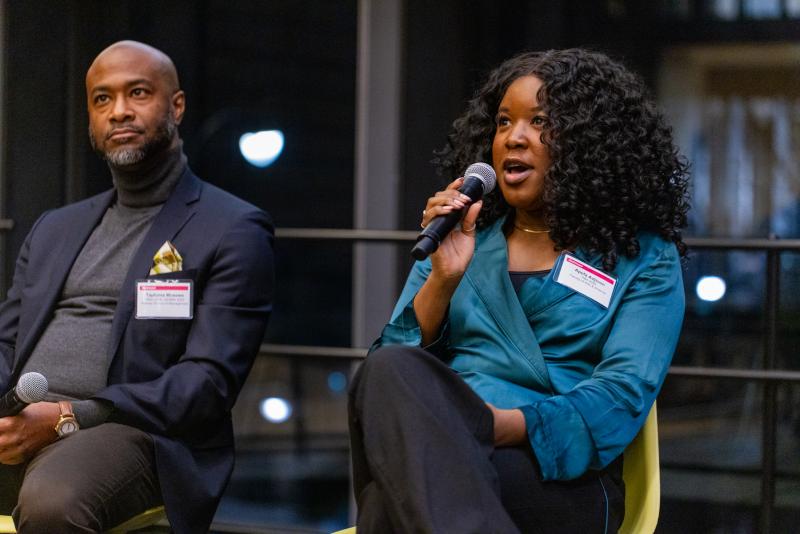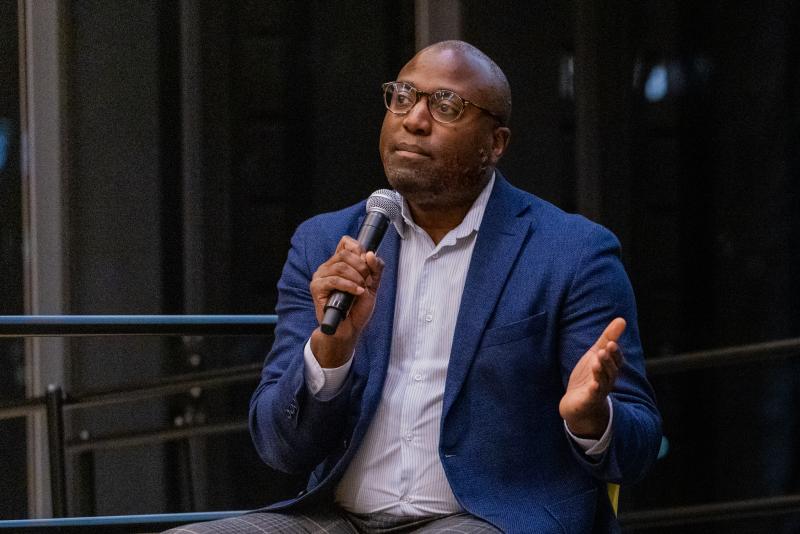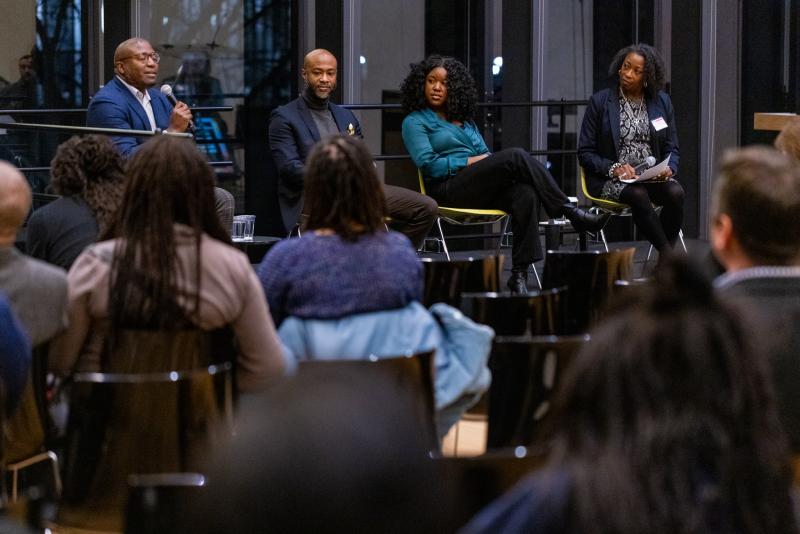February 7, 2024 | Alumni
What does it mean to be Black in the corporate world? U of T alumni weigh in
By Coby Zucker

Tapfuma Musewe and Apefa Adjivon at the “Breaking Barriers, Building Connections” panel. All photos by Kemeisha McDonald.
An engaging alumni panel explored what it means to be Black in corporate spaces in front of an audience of students, alumni and U of T community members gathered in Desautels Hall at Rotman School of Management on Martin Luther King Day, Jan. 15.
The “Breaking Barriers, Building Connections: Bridging the Gap for Black Professionals Panel” was moderated by Ruth C. White, EDI project advisor at Rotman School of Management, and featured panelists Gave Lindo, Tapfuma Musewe and Apefa Adjivon.
“Black people as a whole are over-mentored and under-sponsored,” said Adjivon, who earned her honours bachelor of arts in 2020 as a member of University College. “It doesn’t end at mentorship. Create opportunities and put people’s names forward when you get the chance.”
The event, run jointly by Rotman and the Faculty of Arts & Science, was generously supported by U of T affinity partners Manulife and TD Insurance.
Adjivon is co-chair of the Girls Action Foundation and one of WXN Canada’s 100 Most Powerful Women. The panel also included Lindo, head of content programming at TikTok, and Musewe, associate director of sustainable finance at EYElliance and executive director at Afrifursa, an organization that facilitates equitable opportunities of exchange with African stakeholders.

Adjivon also encouraged companies to see past graduate degrees when considering job applicants, citing the statistic that Black individuals are less likely to have an advanced degree because of systemic barriers related to the cost and debt associated with pursuing education.
“I’m educating my coworkers to value lived experience and to understand that just because someone has letters next to their name does not mean they are necessarily the most qualified for the role,” Adjivon said.
Lindo shared that more diverse candidates from a wider range of backgrounds tend to be hired when information such as name, gender and university is concealed in resumes.
“There are ways companies can be thoughtful about these small adjustments to the way we onboard or the way we promote people that takes into account the human bias factor and helps ensure the outcomes can be more progressive,” said Lindo, who earned his honours bachelor of arts in 2003 as a member of New College.
Lindo also spoke to the importance of volunteering and stepping up as a strategy for advancing within organizations. He encouraged the audience members to show initiative and actively solve problems in their workplaces.
“We can’t always control whether we are hired or promoted,” he said. “However, we can always control how we show up and commit to adding meaningful value.”
Panelists also spoke of how many Black professionals feel the weight of being one of few in their workplaces and hold themselves to a higher standard that can be, at times, damaging.

“We have to give ourselves the latitude to make mistakes,” said Musewe, who earned his honours bachelor of science in 2006 as a member of Innis College. “We have to be okay with being human.”
As someone who spent years working in Africa, Musewe brought to the panel the perspective of how you can leverage your differences and use them to your advantage, particularly in the finance sector.
“It's not just about going to investors and selling the case,” Musewe said. “It's about helping them understand the value in this sector that they've never seen before. And for that, I completely pull on my experience as an African Canadian and shifting the narrative.”
The panel discussion resonated with the audience, which included Black people looking for advice on succeeding as a Black professional, and others seeking ways they can better serve as allies in the corporate world.
“I've been in many spaces where I was one of the only, or one of the few, Black people there,” said attendee Sayo Falada, who earned her honours bachelor of science in 2013 as a member of New College. “And I appreciate hearing from people who have that same experience and who are excelling in their careers.”

